
Romania’s economic landscape presents a paradox of strong EU-driven growth against a backdrop of fiscal challenges, with recent developments highlighting both opportunities and obstacles. As Romanian officials engage in strategic discussions to bolster the country’s economic position, the nation’s ‘BBB-‘ rating by global credit agencies underscores a complex scenario of robust EU ties enriching economic prospects while grappling with significant fiscal deficits.
EU Membership: A Double-Edged Sword
Romania’s strategic position within the European Union has been a catalyst for economic development and stability. Membership in the bloc has facilitated substantial capital inflows, contributing to income convergence, bolstering external finances, and enhancing macroeconomic stability. According to recent press releases and statements from the Consilium, Romania’s integration into the EU’s economic framework has paved the way for the approval of national recovery and resilience plans, positioning the country to capitalize on shared resources and initiatives aimed at fostering long-term growth. Yet, this integration comes with its set of challenges, notably the obligation to adhere to stringent fiscal and economic guidelines imposed by the EU.
Addressing Fiscal and Economic Discrepancies
Despite its strategic advantages, Romania faces considerable hurdles, primarily large twin budget and current account deficits (CAD), a weak record of fiscal consolidation, high budget rigidities, and a fairly high net external debtor position. These factors collectively signal underlying vulnerabilities that could impede the nation’s economic trajectory if not adequately addressed. Experts argue that while Romania’s GDP per capita, governance, and human development indicators rank favorably compared to its ‘BBB’ category peers, the path to sustained fiscal health and economic prosperity requires rigorous policy reforms and fiscal consolidation efforts.
Strategic Investments and Economic Diversification
In a promising development, Euro Sun Mining’s advancement in talks with Romanian Ministries regarding the Rovina Valley project underscores the country’s potential to leverage its natural resources for economic gain. Touted as hosting the second-largest gold deposit in Europe, the project is anticipated to have a significant economic impact on Romania, supporting not only the rebuild of Ukraine but also providing critical mineral security for Europe. This initiative, aligned with the European Commission’s Critical Raw Materials Act, exemplifies Romania’s efforts to diversify its economy and harness strategic sectors for growth. The support from key government ministries for the project’s progression into production marks a critical step towards enhancing Romania’s economic resilience and future prospects.
Romania’s journey towards economic stability and growth is emblematic of the balancing act many emerging economies face within the global and regional economic order. Leveraging EU membership for growth while navigating fiscal challenges requires a strategic and nuanced approach. As Romania continues to implement reforms and engage in strategic economic diversification, the nation stands at a crossroads, with the potential to transform challenges into stepping stones for sustainable development. The outcome of these efforts will not only shape Romania’s economic future but also its role within the broader European economic landscape.






